- Home
- Leslie Meier
St. Patrick's Day Murder Page 3
St. Patrick's Day Murder Read online
Page 3
“There’s no arguing with that,” said Lucy. “The police could have closed the place plenty of times, but they never did. Do you know why, Ted?”
Ted was in the middle of shipping the completed issue to the printer, via the Internet. When he finished, he stretched and leaned back in his chair. “Good job, ladies. Thanks for your hard work.” Then he swiveled his chair around and leaned forward, placing his elbows on his knees. “You know what I think? I think it was one of those ‘the devil you know is better than the one you don’t’ situations. They kept an eye on the place. They never let things get too out of hand. They kind of tolerated it as an escape valve for the town’s rowdy element.”
“Well, I never,” exclaimed Phyllis. “Since when is it up to the police to decide which laws they’re going to enforce?”
“I guess there’s always a little bit of that. Not everything is black and white,” replied Ted. “Cops have to make judgment calls all the time. Should they give a citation or a warning, for example, to the distracted mother with three kids in the car who goes through a stop sign?”
“A warning,” said Lucy.
“A citation,” said Phyllis.
Ted threw up his hands just as the door opened and a handsome man walked in, sporting a thick head of dark hair, an intricately knitted Irish fisherman’s sweater, with a white silk scarf knotted around his neck, and a roguish grin. Lucy recognized him immediately, and her identification was confirmed when he stuck out his hand to Phyllis and, taking hers, lifted it to his lips, announcing himself in a thickly accented voice as “Dylan Malone, straight off the plane from Shannon Airport in Ireland.”
“Enough of your nonsense,” said Phyllis, snatching her hand back and blushing furiously, right up to the roots of her dyed orange hair. It was the one thing she hadn’t changed.
“Look,” exclaimed Lucy, jumping to her feet. “Your photo is still on my computer. I just wrote up the press release about Finian’s Rainbow.”
“Pleased to make your acquaintance,” he said, taking her hand and leaning over it. “And you are?”
“Oh, how silly of me,” dithered Lucy, uncomfortably aware that she, too, was blushing. “I’m Lucy Stone. I work here.”
“So I see,” he said. “And I’m sure you do a wonderful job.”
“Don’t be too sure,” said Ted, getting to his feet and holding out his hand. “I’m Ted Stillings.”
“He’s the boss,” said Phyllis, beaming at Dylan.
“Well, this is certainly a fine establishment, and Tinker’s Cove is as fine a town as I’ve seen anywhere, even in my own country of Ireland,” replied Dylan. “In fact, it’s a bit like Ireland, with the sea and the rocky coast.”
“I’ve never been to Ireland,” said Lucy, “but I’d love to go.”
“Oh, you should. You shouldn’t miss it,” said Dylan as he looked at her closely. “If I’m not mistaken, you’ve got a bit of Irish blood, haven’t you?”
“Not that I know of,” said Lucy. “A bit of everything but, I think.”
“Oh, well, ’tis no matter. People are the same the world over.” He paused. “Now if I may, I wonder if you could help me?”
“Certainly,” said Phyllis, succumbing to his charm. “What can we do for you?”
“Well, you see, we arrived this morning, myself and my wife, Moira, and our little girl, Deirdre, and the plan was that my brother would meet us at Logan Airport in Boston and bring us along here to Tinker’s Cove. But he never turned up at the airport, and when I called him at his home here in Tinker’s Cove, there was no answer, and there was no answer at his place of business, either. So we rented a car and came along, but I confess I’m a mite worried about him, and I wonder if you might know of his whereabouts.”
It was suddenly very quiet in the newspaper office. Finally, after a long pause, Ted asked the question they all feared they knew the answer to. “What is your brother’s name?”
“Why he’s quite well known hereabouts, I believe. He’s a publican and proprietor of a fine establishment known as the Bilge. He’s Daniel Malone, that’s who he is.”
Chapter Three
The only sound in the Pennysaver office was the familiar click as the furnace switched on, followed a moment or two later by the whir of the fan that blew the heated air out through the register, making the venetian blinds rattle.
Dylan looked from one anxious face to another, reading the bad news in their expressions. “Something has happened to my brother?” he asked, raising his thick eyebrows.
“I’m afraid so,” said Ted, clearing his throat. “It seems he went missing about three days ago.”
“Missing? What do you mean?” said Dylan.
“The Bilge has been closed for three days,” said Ted. “And there was no sign of Old Dan”—he paused and swallowed hard—“until this morning. They found a body in the harbor, and they think it’s his.”
Dylan seemed to sway on his feet, so Phyllis quickly wheeled her chair around from behind the counter and held it for him until he was safely seated. “Can I get you a glass of water?” she asked.
“A cup of tea?” suggested Lucy.
“I’m sorry to have to give you such terrible news,” said Ted.
“Jesus, Mary, and Joseph,” said Dylan, whose face had gone quite white. “This is terrible news. Terrible news indeed,” he said, shaking his head.
“I’m so sorry,” said Lucy. “This must be a dreadful shock.”
“Indeed it is,” said Dylan, shaking his head. “He was in the best of health. He said he was in fine fettle. Those were his very words. ‘Couldn’t be finer,’ he said last time I spoke with him.” He looked at Lucy. “You say they found him in the harbor?”
“Well, they found a body in the harbor,” replied Lucy. “They’re not absolutely sure it’s his.”
Dylan seized upon this bit of information eagerly. “You say they’re not sure? There’s a chance it could be someone else?”
Lucy shook her head apologetically. “I don’t think there’s really any doubt that it’s your brother. It’s a formality really.”
“Well then, why not say so?” asked Dylan.
Lucy looked at the wall, which featured a calendar with a photo of a tall-steepled white church nestled in snow-covered hills. Picture-perfect New England. “It’s the condition of the body that’s the problem.”
Dylan furrowed those magnificent eyebrows. “But it’s only been three days, and it’s been very cold, hasn’t it?”
Lucy sighed and looked at Ted, hoping for some help.
He stepped forward. “There’s no easy way to tell you,” he said. “The body is headless.”
Dylan seemed to suffer a delayed reaction when he heard the word. It almost seemed to Lucy that he had been expecting it. But then he quickly exclaimed, “Dear God!” and covered his face with his hands. He remained in the chair, with his head bowed, for what seemed like a long time. Then, slowly, he seemed to rally and got to his feet. “Life goes on,” he said. “There are things I must do. My wife and daughter are outside in the car. They can’t sit there all day. And there’s the body. I must see to that.”
“Of course,” said Ted. “Why don’t I take you to the police station?”
Dylan nodded in agreement, then hesitated. “The police station is no place for my daughter,” he said.
“Of course not,” agreed Lucy. “She must be exhausted from her long trip.”
“My wife, too,” said Dylan. “We were going to stay at my brother’s place, but now…”
“There’s a lovely inn here in town,” suggested Lucy. “It’s quaint and quiet….”
“You’d get off-season rates,” said Phyllis.
“That sounds perfect,” said Dylan. “It will be a great relief to me to get them settled.” He got to his feet slowly, as if it required extreme effort. “I’ll meet you outside. We’re parked right in front. But give me a moment. I need to explain to my wife what’s happened.”
Once he was gone, t
he three exhaled a collective sigh.
“Talk about bad timing,” said Lucy, rolling her eyes.
“I hope I never have to go through something like that again,” declared Ted. “Telling the poor man his brother is dead.”
Phyllis shook her head and clucked her tongue. “Hardly the family reunion they were hoping for.” She sighed. “Well, you two better get going. I’ll stay here and hold the fort.”
Lucy and Ted put on their coats and went out to the sidewalk, waiting just outside the door until Dylan waved them over.
He was standing next to a white compact rental car, with his arm around a slim woman who was wrapped in a long black cape that was fastened at the neck by an intricate silver clasp with elaborate twists and knots. A large hood covered her head, but locks of curly red hair escaped and were whipped by the wind against her lightly freckled cheeks. Her features were delicate, and she had large green eyes and a little, pointed chin.
“Meet my wife, Moira,” said Dylan.
“Pleased to meet you,” said Lucy, extending her hand. Moira took it with both gloved hands. “I’m Lucy Stone. I’ll take you over to the inn while Ted, Ted Stillings, goes to the police station with your husband.”
“Thank you so much,” said Moira, speaking in a breathy little voice. “I really appreciate your help.”
“We’re glad to help,” said Lucy. “Shall I drive?”
“That would be best,” said Dylan. “Moira’s not used to American cars yet.”
Lucy opened the driver side door and saw a little girl, just about the same age as her own daughter Zoe, sitting in the backseat. “Hi, there,” she said, sliding behind the steering wheel while Moira got settled in the passenger seat.
“Deirdre, me darling, what’s happened to your manners? What do you say to Lucy here, who’s going to take us to the hotel?”
The little girl sat a bit straighter and piped up. “How do you do?”
“Very well indeed, thank you,” said Lucy. “And in just a few minutes, we’ll have you settled nice and comfy at the Queen Victoria Inn.”
The Queen Vic offered the best lodging in Tinker’s Cove. It was built in the late nineteenth century, when the expansion of the railroads made it possible for city dwellers to escape the summer heat in the mountains or at the seashore. Large hotels were built to meet the demand for accommodations, and several had been built in Tinker’s Cove, but only the Queen Vic had survived. It had been renovated, of course, and now boasted luxurious king-size beds and marble baths, but the roomy wraparound porch, with its ranks of rocking chairs, and the dining room and parlors remained much the same as they had looked over a hundred years ago. Antique furniture stood on thick, plush rugs; crisp white curtains hung at the windows; and enormous potted plants filled the corners.
“This is quite charming,” exclaimed Moira, cutting quite a dramatic figure as Lucy held the door for her and she swept up to the registration desk, with the cape streaming behind her. Once there she lifted the hood back with a graceful motion and shook her red hair loose.
“I’ll go and get the bags,” offered Lucy, who didn’t want to intrude while Moira went through the business of getting a room. Then, stifling a stab of resentment when she found herself wrestling two oversized suitcases up the steps, she wondered why she’d been so quick to volunteer for bellhop duty. Once inside, she toted the wheeled bags down the hall, following Moira, who was holding the room key in one hand and Deirdre’s little hand in the other.
Lucy felt rather awkward once they were inside the room, so she quickly took her leave. “I’m sure you want to get settled,” she began, “but let me give you my phone number….”
“Oh, Lucy, don’t run off,” said Moira, removing her cape and laying it on the bed. She then sat down and started unzipping Deirdre’s little pink parka. As she watched the cozy domestic scene, Lucy could practically feel her heart melting and oozing with sympathy. She could only imagine what it must be like to be alone and adrift in a strange country.
With her coat removed, Deirdre was revealed to have her father’s dark hair and her mother’s little, pointed chin, along with a pair of the biggest, greenest eyes and the longest lashes Lucy had ever seen. Moira sent her into the bathroom to wash her hands, and when she emerged, she stood in the doorway and gave an enormous yawn.
“I think perhaps it’s time for a nap,” said Moira, settling the little girl on a chaise lounge that sat in the corner, covering her with her cape. “Mommy will be right down the hall,” she said, smoothing the child’s hair and giving her a kiss. “Come along, Lucy. Let’s see if they can give us a cup of tea while we get acquainted.”
Once again, Lucy found herself following Moira, who was wearing a long black skirt and an emerald green cashmere sweater, down the hall to the parlor, where they perched on an extremely curvy and lavishly carved Victorian sofa. Moira seemed to do little more than snap her fingers and a tea tray magically appeared, complete with finger sandwiches and an assortment of little cakes and cookies.
“You must be famished,” said Lucy, helping herself to a cream cheese and date-nut bread sandwich. She certainly was, since she hadn’t had lunch yet.
“No, not really,” said Moira, lifting the teapot and pouring. “I always feel bloated after a transatlantic flight. They give you too much food, and you can’t move around much.”
This was news to Lucy. She hadn’t heard anybody complain of too much food on an airplane flight for some time now.
“In the States, it’s a tiny bag of five peanuts and a little cup of soda—if you’re lucky,” she said, but Moira ignored her conversational gambit.
“Can you tell me what really happened to Dan?” she asked, placing one hand on Lucy’s knee and leaning toward her. “I didn’t want to talk about it in front of Deirdre, you see.”
“Of course,” said Lucy, unconsciously recrossing her legs so Moira had to move her hand. “All I know is that they found a body in the harbor, and they think it’s Old Dan. That’s what everybody called him here,” she added, by way of apology. “Did you know him well?”
“Never met him,” said Moira, taking a sip of milky tea. “He moved to America years before Dylan and I got married.”
“Was Dylan close to his brother?”
“Not really,” she said, replacing her cup in its saucer. “I was a bit surprised when Dylan said he wanted to take this directing job because it would give him a chance to get reacquainted with his brother. It’s a bit of a busman’s holiday, really. Combining work with a family reunion.” She gave a little tinkly laugh. “A very small family reunion to be sure, since there are only the four of us.” Her hand fluttered to her mouth. “Ah, me, now it’s only three.”
“I know Dylan is supposed to direct Finian’s Rainbow at the church,” said Lucy, helping herself to a second little triangle of chicken salad on white bread. “Do you think he’ll still do it?”
Moira seemed shocked at the question. “Of course. The show must go on!”
“Not really,” said Lucy. “I mean, I’m sure the church could find someone else if your husband finds it too difficult to carry on.”
Moira shook her head emphatically, making her long, curly locks bounce. “He’s a professional. It wouldn’t cross his mind to quit.” She took another sip of tea. “Besides, there will be business to attend to. Daniel had a pub, and a house, too? I believe he was doing quite well. At least that’s what we were given to think back in Ireland.”
“I don’t really know,” confessed Lucy. “The Bilge was popular, and he did a good business, but I don’t know if he owned the building or not. As for the house, I don’t have any idea of its value.”
Moira tilted her head back and ran her fingers through her hair. “Tinker’s Cove seems like quite a prosperous place. All the houses are well kept. Business seems to be thriving. I suppose property values have risen considerably over the last few years?”
Lucy was a bit taken aback. Was she already calculating her husband’s likely inher
itance? “Like everywhere, I guess,” said Lucy. “There is still quite a bit of poverty here.”
“Really? I wouldn’t have thought so.”
“A lot of traditional industries, like fishing, are disappearing, and people have a hard time finding jobs that pay well. And then there are immigrants. Brazilians, Haitians, Somalians, all sorts of people are turning up. There’s plenty of work for them in the summer, what with the tourists and all, but it all disappears come winter. It’s a real problem, and there doesn’t seem to be an easy solution.”
Moira’s expression made it clear she really wasn’t interested in other people’s problems. “I really ought to check on Deirdre,” she said, standing up.
“She’s a lovely little girl,” said Lucy. “I have a daughter about her age. Zoe’s ten. Perhaps she’d like to come and play with her?”
“That’s very kind of you,” said Moira, with a little smile. “She’s already saying that she misses her friends from home.”
“We’d love to have her visit…anytime at all,” said Lucy. “Here. Let me write my home number on my card. Most of the time you can reach me at the paper, though.”
Moira took the card and studied it. “Do you have a mobile?” she asked, pen in hand.
Lucy recited the number, wondering exactly where the pen had materialized from. Was it in her pocket? Lying on a side table? Was it summoned out of thin air? It was beginning to seem like a very long and confusing day. She needed some time to herself to sort things out.
“I’ve got to go,” said Lucy. “I hope you’ll be comfortable here, and let me know if I can do anything for you.”
“You’re too kind,” boomed a hearty voice behind her, and she turned to see Dylan coming through the door. He stopped in the middle of the room and looked around appreciatively. “And a fine place you’ve found for us.” He took a deep breath and placed his hands on his wife’s shoulders. “Ah, Moira me darling, you’ll find people here are very kind and welcoming. We got off to a bit of a rough start, I’ll admit, but things are going to be fine. You’ll see.”

 Christmas Card Murder
Christmas Card Murder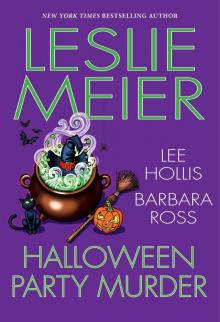 Halloween Party Murder
Halloween Party Murder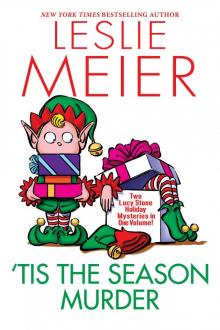 'Tis the Season Murder
'Tis the Season Murder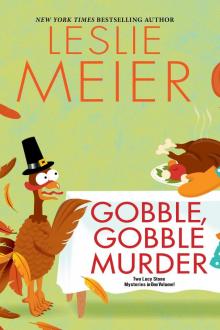 Gobble, Gobble Murder
Gobble, Gobble Murder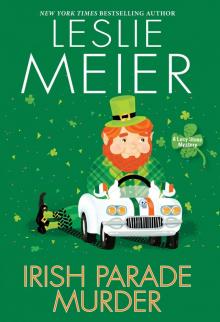 Irish Parade Murder
Irish Parade Murder Bake Sale Murder
Bake Sale Murder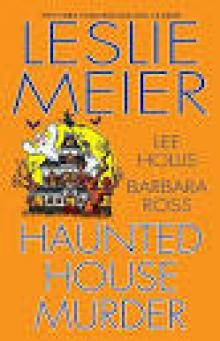 Haunted House Murder
Haunted House Murder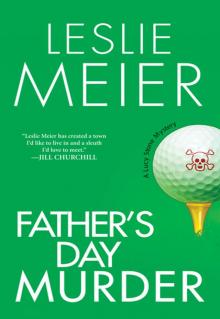 Father’s Day Murder
Father’s Day Murder Chocolate Covered Murder
Chocolate Covered Murder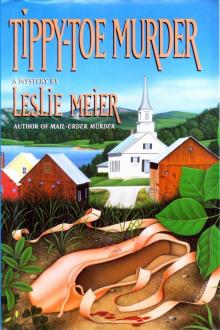 Tippy Toe Murder
Tippy Toe Murder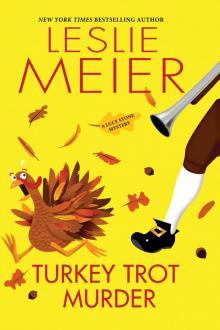 Turkey Trot Murder
Turkey Trot Murder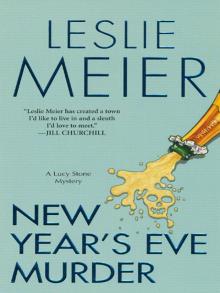 New Year's Eve Murder
New Year's Eve Murder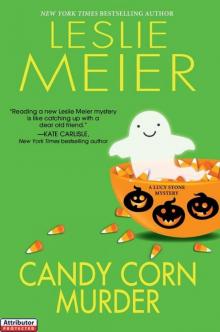 Candy Corn Murder
Candy Corn Murder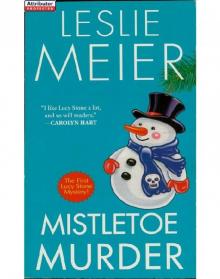 Mistletoe Murder
Mistletoe Murder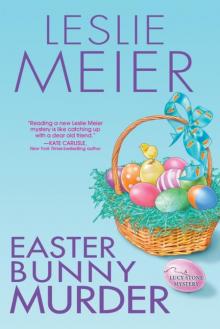 LStone 20 - Easter Bunny Murder
LStone 20 - Easter Bunny Murder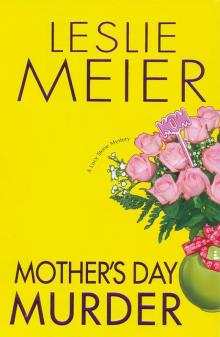 Mother's Day Murder
Mother's Day Murder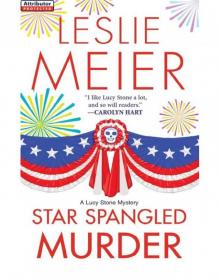 Star Spangled Murder
Star Spangled Murder Silver Anniversary Murder
Silver Anniversary Murder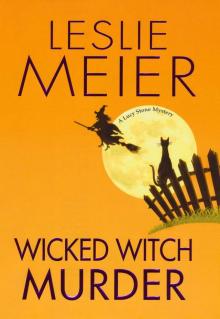 Wicked Witch Murder
Wicked Witch Murder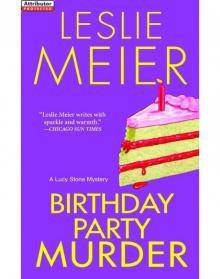 Birthday Party Murder
Birthday Party Murder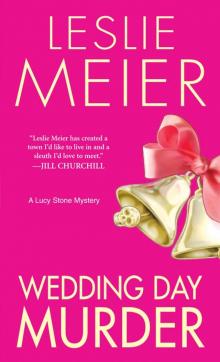 Wedding Day Murder
Wedding Day Murder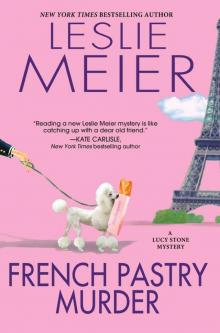 French Pastry Murder
French Pastry Murder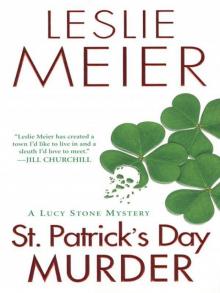 St. Patrick's Day Murder
St. Patrick's Day Murder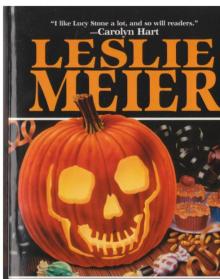 Trick or Treat Murder
Trick or Treat Murder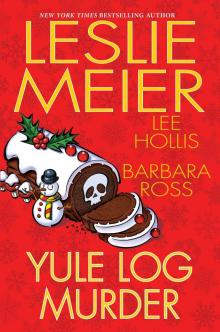 Yule Log Murder
Yule Log Murder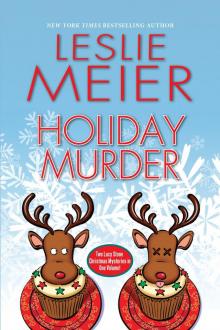 Holiday Murder
Holiday Murder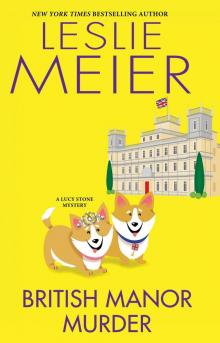 British Manor Murder
British Manor Murder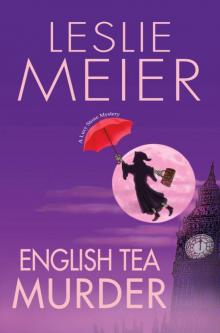 English Tea Murder
English Tea Murder